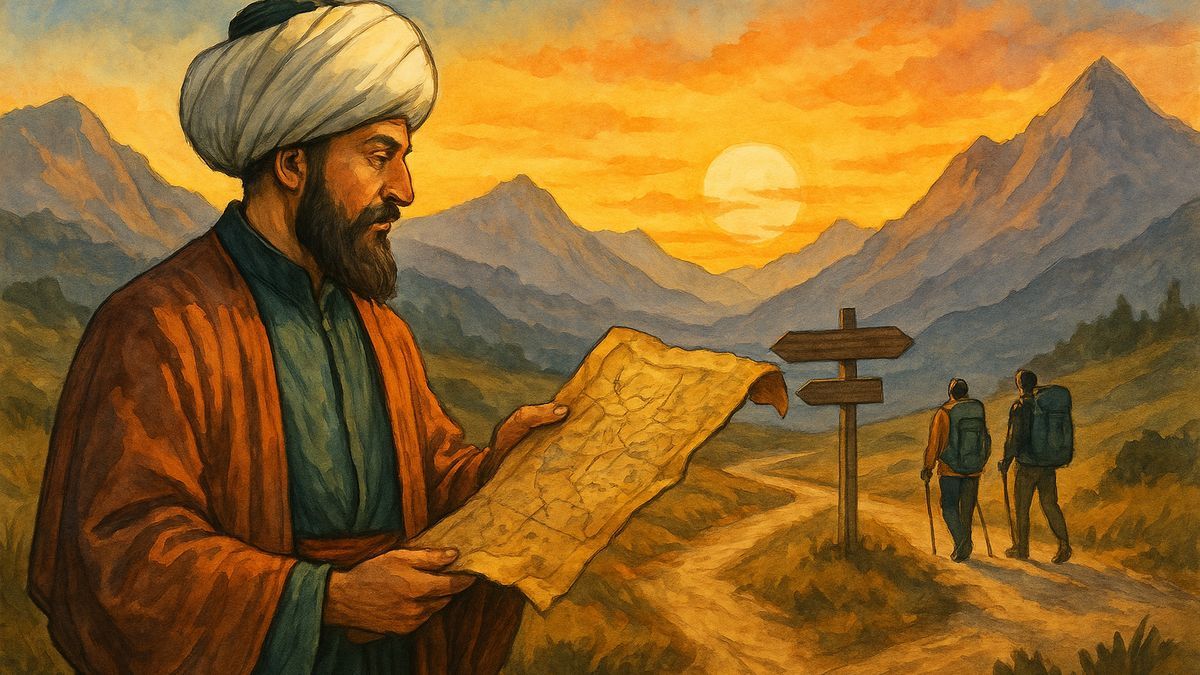Discover how 17th-century Ottoman explorer Evliya Çelebi’s 40-year journey across the world offers timeless lessons for today’s authentic travellers seeking adventure beyond tourist crowds. While today’s travellers chase Instagram-worthy moments at overcrowded landmarks, there was once a man who spent 40 years exploring the world not for followers, but for pure curiosity and authentic human connection. His name was Evliya Çelebi, and he might be history’s greatest argument for choosing genuine adventure over manufactured tourism.
Ottoman Explorer: Recent lectures at Qatar National Library have brought renewed attention to this remarkable 17th-century Ottoman explorer whose approach to travel stands in stark contrast to today’s hashtag-driven wanderlust. For modern adventurers seeking authentic experiences beyond the tourist trail, Çelebi’s philosophy and methods offer profound insights that could revolutionise how we explore our world. Description notes duration price description notes duration
The Anti-Tourist of the Ottoman Explorer
Ottoman Explorer: Born in Istanbul in 1611, Evliya Çelebi embarked on a journey that would make modern backpackers seem like weekend warriors. For four decades, he traversed the Ottoman Empire and beyond, covering territories that spanned three continents. But unlike today’s travel influencers documenting their experiences for external validation, Çelebi travelled purely for the love of discovery and cultural understanding.
His masterwork, the “Seyahatnâme” (Book of Travel), spans ten volumes and represents one of history’s most comprehensive travel accounts. Written in accessible Turkish rather than the formal Ottoman court language, it reads like the journal of someone genuinely fascinated by the world around him – not someone trying to impress an audience.
What Made Çelebi Different
While medieval travellers often focused on pilgrimage routes or trade opportunities, Çelebi was driven by insatiable curiosity about human diversity. He documented everything from architectural marvels to local dialects, from religious practices to regional cuisine. His approach was anthropological before anthropology existed as a discipline.
Most importantly, he travelled not as a conqueror or merchant, but as a genuine student of the world. This mindset – approaching travel as education rather than entertainment – separated authentic explorers from mere tourists long before mass tourism existed.
Ottoman Explorer Lessons for Modern Adventure Travellers
Ottoman Explorer: Today’s authentic travellers, those who choose challenging hikes over hotel pools and local markets over shopping malls, share more in common with Çelebi than they might realise. His centuries-old wisdom offers surprising relevance for anyone seeking genuine adventure in our interconnected world.
Travel Light, Think Heavy
Çelebi understood what modern adventurers are rediscovering: the less you carry, the more you experience. While he couldn’t have imagined today’s lightweight travel gear, his philosophy of minimalism enabled deeper engagement with places and people.
Modern travellers pursuing authentic experiences need equipment that enhances rather than hinders their journey. Just as Çelebi carried only essentials, today’s adventure travellers benefit from gear designed for exploration, not exhibition. The right travel bag becomes an extension of your adventurous spirit – lightweight enough to not slow you down, yet robust enough to protect what matters most.
Document Experiences, Not Poses
Çelebi’s detailed observations of 17th-century life now provide invaluable historical insights. He wrote about ordinary people living extraordinary lives, capturing cultural nuances that official histories missed. His “documentation” served future understanding rather than immediate social approval.
Today’s meaningful travel documentation should serve a similar purpose: preserving authentic experiences and genuine cultural encounters rather than manufacturing envy-inducing content. The best travel stories emerge from genuine curiosity about how others live, not from staged moments designed for social media consumption.
Embrace Discomfort as Discovery
Çelebi’s journeys involved significant hardships – dangerous mountain passes, unpredictable weather, and accommodation that would horrify modern luxury travellers. Yet he viewed these challenges as integral parts of the adventure, opportunities to test his resilience and deepen his appreciation for comfort when found.
Ottoman Explorer: travellers understand this principle instinctively. The most memorable journeys often involve some discomfort: sleeping under unfamiliar stars, navigating without GPS, or communicating through gestures when language barriers arise. These moments create the strongest memories and most profound personal growth.
The Geography of Authentic Adventure
Ottoman Explorer: Çelebi’s routes took him through regions that today’s travellers might overlook in favour of more “Instagrammable” destinations. He explored remote Caucasus villages, documented obscure Balkan cultures, and spent time in places where few outsiders ventured.
Hidden Territories Worth Exploring
Following Çelebi’s example, modern adventurers should seek destinations that offer cultural authenticity over visual spectacle. Consider exploring:
The Carpathian Mountains of Romania: Remote villages preserve medieval traditions while offering challenging hiking and authentic cultural immersion.
Rural Anatolia, Turkey: Çelebi’s homeland still contains countless villages where traditional crafts and customs survive largely unchanged.
The Caucasus Region: Georgia, Armenia, and Azerbaijan offer dramatic landscapes and rich cultural heritage with minimal tourist infrastructure.
Remote Balkan Valleys: Montenegro, Albania, and North Macedonia hide pristine wilderness areas and communities maintaining ancient traditions.
These destinations require more planning and flexibility than typical tourist routes, but they offer the kind of authentic experiences that Çelebi would have appreciated – encounters with genuine local culture rather than performances designed for visitors.
Modern Tools for Ancient Wisdom
Ottoman Explorer: While Çelebi relied on horseback travel and handwritten journals, today’s authentic adventurers have access to tools that would have amazed the great Ottoman explorer. The key is using modern equipment to facilitate genuine exploration rather than to create comfort bubbles that insulate us from authentic experiences.
The Right Gear Philosophy
Çelebi carried minimal possessions but chose each item carefully for maximum utility. Modern adventure travellers should adopt similar principles: every piece of equipment should serve multiple purposes and enhance rather than complicate the journey.
The ideal travel bag for serious adventurers embodies this philosophy – lightweight yet weatherproof, spacious yet streamlined, durable yet unobtrusive. It should blend into any environment while protecting valuables and essentials. Most importantly, it shouldn’t announce your tourist status to everyone you encounter.
Technology as a Tool, Not a Crutch
Ottoman Explorer: While Çelebi navigated using local knowledge and celestial observations, modern travellers can use GPS and smartphones to access remote locations previously impossible to reach independently. The key is using technology to enable adventure rather than replace it.
Use mapping apps to find hiking trails that don’t appear in guidebooks. Employ translation apps to communicate with locals in their own language. Leverage weather forecasting to time your adventures safely. But resist the temptation to document every moment for social media consumption.

The Çelebi Mindset: Curiosity Over Conquest
Ottoman Explorer: Perhaps Çelebi’s most valuable lesson for modern travellers is his fundamental approach to cultural difference. Rather than judging foreign customs by Ottoman standards, he observed with genuine curiosity and respect. This mindset enabled him to gain insights that remained hidden from more judgmental travellers.
Becoming a Cultural Student
Every destination offers lessons for those willing to learn. Instead of seeking familiar comforts in foreign places, embrace the opportunity to understand different ways of living. Ask questions, observe social interactions, and participate in local customs when invited.
This approach requires humility and openness that many tourists avoid. It’s easier to stay in international hotel chains and eat familiar food than to navigate local customs and try unfamiliar cuisines. But authentic adventure travellers understand that discomfort often precedes discovery.
Building Genuine Connections
Çelebi’s most valuable insights came from conversations with ordinary people – merchants, artisans, religious figures, and local officials. He understood that genuine cultural understanding emerges from human connection rather than superficial observation.
Modern travellers can follow his example by seeking genuine interactions with locals rather than limiting themselves to service industry encounters. Stay in family-run accommodations, shop at local markets, attend community events, and learn basic phrases in local languages.
Planning Your Own Çelebi-Inspired Adventure
Ottoman Explorer: Ready to embrace the Ottoman explorer’s approach to travel? Start by identifying destinations that offer cultural authenticity rather than just scenic beauty. Look for places where traditional ways of life persist, where modern tourism hasn’t yet transformed local culture into performance.
Essential Preparation
Research the history and culture of your chosen destination, but avoid over-planning specific activities. Çelebi’s best discoveries were often unplanned encounters that rigid itineraries would have prevented.
Invest in quality gear that will perform reliably in challenging conditions. Your equipment should be tough enough to handle whatever you encounter, yet light enough to carry comfortably for extended periods.
Learn basic local language skills and cultural customs. Understanding simple greetings and social norms demonstrates respect and opens doors to more meaningful interactions.
The Journey Begins
Ottoman Explorer: Çelebi understood that great journeys begin not when you reach your destination, but when you decide to see the world through curious rather than judgmental eyes. His four decades of exploration were possible because he approached each new place as a student rather than a tourist.
Modern adventurers seeking authentic experiences can embrace this same mindset. Choose destinations that challenge your assumptions. Pack light but pack smart. Document your experiences for understanding rather than approval. Most importantly, travel with genuine curiosity about how other people live their extraordinary ordinary lives.
The world is full of places where authentic culture thrives away from tourist crowds, where genuine adventure awaits those willing to venture beyond familiar comforts. Your own 21st-century version of the Seyahatnâme is waiting to be written – not for Instagram likes, but for the same reason Evliya Çelebi spent 40 years exploring: because the world is endlessly fascinating for those brave enough to explore it authentically.


